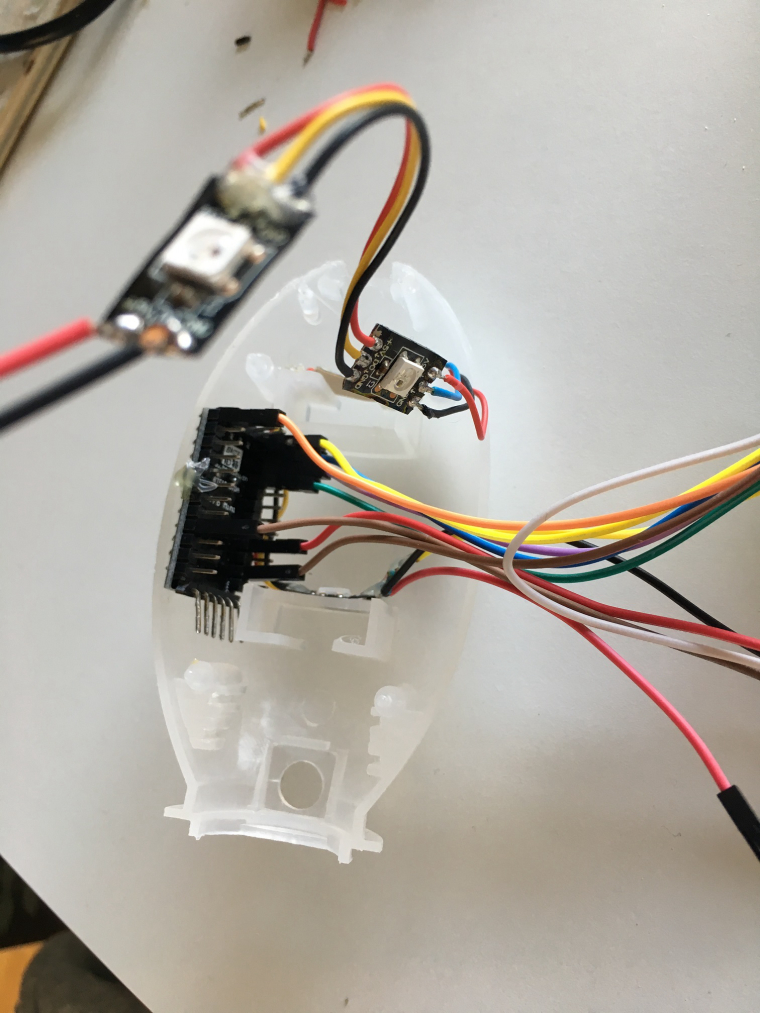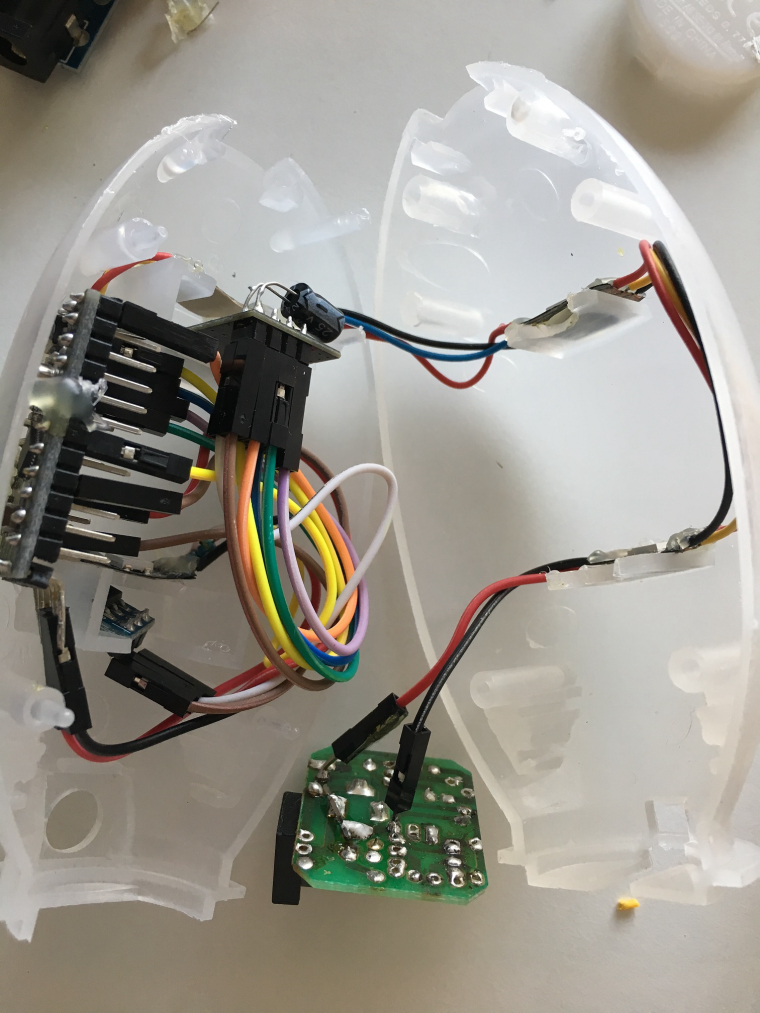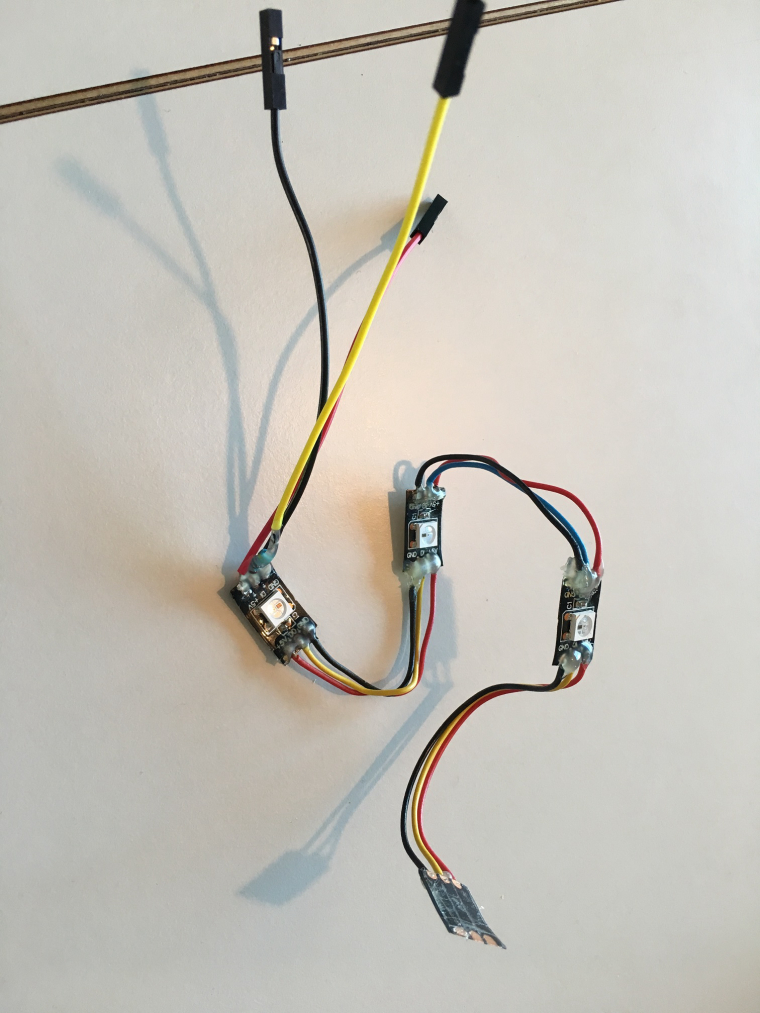IKEA Spöke/Spoke(ghost)
-
I have rebuilt IKEA Spöke(ghost) to be used with MyS and Pro Mini 5V
I replaced LED with 4 pcs WS2812B LED's.
Removed all components on POWER PCB, I only use the PCB to get 5V.
Button is removed.
No battery is used, only power from 5v adapter. To drive nRF I used step-down 5->3.3V
When you solder the Ground pin on the PCB, check carefully from where you take the GND, when the plug is inserted you will NOT get GND from all GND spots/places.
If you will build this think about this/next version:
Use more LED's, maybe 6 or 8. Change in sketch!!
Remove LED on step-down and LED on Pro Mini, will light up alot during night if lamp is off
Add function for button, so you can start it without access to your controller
Add Repeater function, why not it is on power all the timeVideo: https://youtu.be/sNSBahc-79s
Link to IKEA Spoke http://www.ikea.com/gb/en/products/childrens-ikea-products/children-3-7/childrens-lighting/spöka-led-night-light-animal-white-turquoise-art-00150985/I use the color to tell my kids when it is OK to wake up :), sometimes they wake up at 6 am!!. When time is ok to go up from bed it shows green otherwise it shows red/purple light during whole night.
To put the silicon back I forst used a lot of power, then I tried with alcohol it was a piece of cake. The alcohol will vaporize.
This is the sketch/*PROJECT: MySensors / RGB test for Light & Sensor PROGRAMMER: AWI/GizMoCuz DATE: september 27, 2015/ last update: October 10, 2015 FILE: AWI_RGB.ino LICENSE: Public domain Hardware: Nano and MySensors 1.5 Special: uses Fastled library with NeoPixel (great & fast RBG/HSV universal library) https://github.com/FastLED/FastLED Remarks: Fixed node-id Added option to request/apply last light state from gateway Domoticz typicals - 2015 10 10: - Domoticz is using HUE values internally, there might be a slight difference then using direct RGB colors. */ #include <MySensor.h> #include <SPI.h> #include <FastLED.h> const int stripPin = 4 ; // pin where 2812 LED strip is connected const int numPixel = 4 ; // set to number of pixels #define NODE_ID 254 // fixed MySensors node id #define CHILD_ID 0 // Child Id's CRGB leds[numPixel]; char actRGBvalue[] = "000000"; // Current RGB value uint16_t actRGBbrightness = 0xFF ; // Controller Brightness int actRGBonoff=0; // OnOff flag MySensor gw; MyMessage lastColorStatusMsg(CHILD_ID,V_VAR1); void setup() { FastLED.addLeds<NEOPIXEL, stripPin >(leds, numPixel); // initialize led strip gw.begin(incomingMessage, AUTO, false); // initialize MySensors gw.sendSketchInfo("AWI RGB Light", "1.1"); gw.present(CHILD_ID, S_RGB_LIGHT); // present to controller // Flash the "hello" color sequence: R, G, B, black. colorBars(); //Request the last stored colors settings gw.request(CHILD_ID, V_VAR1); } void loop() { gw.process(); // wait for incoming messages } void colorBars() { SendColor2AllLEDs( CRGB::Red ); FastLED.show(); delay(500); SendColor2AllLEDs( CRGB::Green ); FastLED.show(); delay(500); SendColor2AllLEDs( CRGB::Blue ); FastLED.show(); delay(500); SendColor2AllLEDs( CRGB::Black ); FastLED.show(); delay(500); } void SendColor2AllLEDs(const CRGB lcolor) { for(int i = 0 ; i < numPixel ; i++) { leds[i] = lcolor; } } void SendLastColorStatus() { String cStatus=actRGBvalue+String("&")+String(actRGBbrightness)+String("&")+String(actRGBonoff); gw.send(lastColorStatusMsg.set(cStatus.c_str())); } String getValue(String data, char separator, int index) { int found = 0; int strIndex[] = {0, -1}; int maxIndex = data.length()-1; for(int i=0; i<=maxIndex && found<=index; i++){ if(data.charAt(i)==separator || i==maxIndex){ found++; strIndex[0] = strIndex[1]+1; strIndex[1] = (i == maxIndex) ? i+1 : i; } } return found>index ? data.substring(strIndex[0], strIndex[1]) : ""; } void incomingMessage(const MyMessage &message) { if (message.type == V_RGB) { // check for RGB type actRGBonoff=1; strcpy(actRGBvalue, message.getString()); // get the payload SendColor2AllLEDs(strtol(actRGBvalue, NULL, 16)); SendLastColorStatus(); } else if (message.type == V_DIMMER) { // if DIMMER type, adjust brightness actRGBonoff=1; actRGBbrightness = map(message.getLong(), 0, 100, 0, 255); FastLED.setBrightness( actRGBbrightness ); SendLastColorStatus(); } else if (message.type == V_STATUS) { // if on/off type, toggle brightness actRGBonoff = message.getInt(); FastLED.setBrightness((actRGBonoff == 1)?actRGBbrightness:0); SendLastColorStatus(); } else if (message.type==V_VAR1) { // color status String szMessage=message.getString(); strcpy(actRGBvalue, getValue(szMessage,'&',0).c_str()); actRGBbrightness=atoi(getValue(szMessage,'&',1).c_str()); actRGBonoff=atoi(getValue(szMessage,'&',2).c_str()); SendColor2AllLEDs(strtol(actRGBvalue, NULL, 16)); FastLED.setBrightness((actRGBonoff == 1)?actRGBbrightness:0); } FastLED.show(); }


-
I have rebuilt IKEA Spöke(ghost) to be used with MyS and Pro Mini 5V
I replaced LED with 4 pcs WS2812B LED's.
Removed all components on POWER PCB, I only use the PCB to get 5V.
Button is removed.
No battery is used, only power from 5v adapter. To drive nRF I used step-down 5->3.3V
When you solder the Ground pin on the PCB, check carefully from where you take the GND, when the plug is inserted you will NOT get GND from all GND spots/places.
If you will build this think about this/next version:
Use more LED's, maybe 6 or 8. Change in sketch!!
Remove LED on step-down and LED on Pro Mini, will light up alot during night if lamp is off
Add function for button, so you can start it without access to your controller
Add Repeater function, why not it is on power all the timeVideo: https://youtu.be/sNSBahc-79s
Link to IKEA Spoke http://www.ikea.com/gb/en/products/childrens-ikea-products/children-3-7/childrens-lighting/spöka-led-night-light-animal-white-turquoise-art-00150985/I use the color to tell my kids when it is OK to wake up :), sometimes they wake up at 6 am!!. When time is ok to go up from bed it shows green otherwise it shows red/purple light during whole night.
To put the silicon back I forst used a lot of power, then I tried with alcohol it was a piece of cake. The alcohol will vaporize.
This is the sketch/*PROJECT: MySensors / RGB test for Light & Sensor PROGRAMMER: AWI/GizMoCuz DATE: september 27, 2015/ last update: October 10, 2015 FILE: AWI_RGB.ino LICENSE: Public domain Hardware: Nano and MySensors 1.5 Special: uses Fastled library with NeoPixel (great & fast RBG/HSV universal library) https://github.com/FastLED/FastLED Remarks: Fixed node-id Added option to request/apply last light state from gateway Domoticz typicals - 2015 10 10: - Domoticz is using HUE values internally, there might be a slight difference then using direct RGB colors. */ #include <MySensor.h> #include <SPI.h> #include <FastLED.h> const int stripPin = 4 ; // pin where 2812 LED strip is connected const int numPixel = 4 ; // set to number of pixels #define NODE_ID 254 // fixed MySensors node id #define CHILD_ID 0 // Child Id's CRGB leds[numPixel]; char actRGBvalue[] = "000000"; // Current RGB value uint16_t actRGBbrightness = 0xFF ; // Controller Brightness int actRGBonoff=0; // OnOff flag MySensor gw; MyMessage lastColorStatusMsg(CHILD_ID,V_VAR1); void setup() { FastLED.addLeds<NEOPIXEL, stripPin >(leds, numPixel); // initialize led strip gw.begin(incomingMessage, AUTO, false); // initialize MySensors gw.sendSketchInfo("AWI RGB Light", "1.1"); gw.present(CHILD_ID, S_RGB_LIGHT); // present to controller // Flash the "hello" color sequence: R, G, B, black. colorBars(); //Request the last stored colors settings gw.request(CHILD_ID, V_VAR1); } void loop() { gw.process(); // wait for incoming messages } void colorBars() { SendColor2AllLEDs( CRGB::Red ); FastLED.show(); delay(500); SendColor2AllLEDs( CRGB::Green ); FastLED.show(); delay(500); SendColor2AllLEDs( CRGB::Blue ); FastLED.show(); delay(500); SendColor2AllLEDs( CRGB::Black ); FastLED.show(); delay(500); } void SendColor2AllLEDs(const CRGB lcolor) { for(int i = 0 ; i < numPixel ; i++) { leds[i] = lcolor; } } void SendLastColorStatus() { String cStatus=actRGBvalue+String("&")+String(actRGBbrightness)+String("&")+String(actRGBonoff); gw.send(lastColorStatusMsg.set(cStatus.c_str())); } String getValue(String data, char separator, int index) { int found = 0; int strIndex[] = {0, -1}; int maxIndex = data.length()-1; for(int i=0; i<=maxIndex && found<=index; i++){ if(data.charAt(i)==separator || i==maxIndex){ found++; strIndex[0] = strIndex[1]+1; strIndex[1] = (i == maxIndex) ? i+1 : i; } } return found>index ? data.substring(strIndex[0], strIndex[1]) : ""; } void incomingMessage(const MyMessage &message) { if (message.type == V_RGB) { // check for RGB type actRGBonoff=1; strcpy(actRGBvalue, message.getString()); // get the payload SendColor2AllLEDs(strtol(actRGBvalue, NULL, 16)); SendLastColorStatus(); } else if (message.type == V_DIMMER) { // if DIMMER type, adjust brightness actRGBonoff=1; actRGBbrightness = map(message.getLong(), 0, 100, 0, 255); FastLED.setBrightness( actRGBbrightness ); SendLastColorStatus(); } else if (message.type == V_STATUS) { // if on/off type, toggle brightness actRGBonoff = message.getInt(); FastLED.setBrightness((actRGBonoff == 1)?actRGBbrightness:0); SendLastColorStatus(); } else if (message.type==V_VAR1) { // color status String szMessage=message.getString(); strcpy(actRGBvalue, getValue(szMessage,'&',0).c_str()); actRGBbrightness=atoi(getValue(szMessage,'&',1).c_str()); actRGBonoff=atoi(getValue(szMessage,'&',2).c_str()); SendColor2AllLEDs(strtol(actRGBvalue, NULL, 16)); FastLED.setBrightness((actRGBonoff == 1)?actRGBbrightness:0); } FastLED.show(); }


-
@flopp Nice hack! :+1:
I also took apart an old Spoka once, but never managed to get the silicon back on... Aparantly you figured it out!
